沪教版六年级英语下册Unit1~4复习资料
牛津沪教版六年级下Units 1-5重点语法及重点词汇
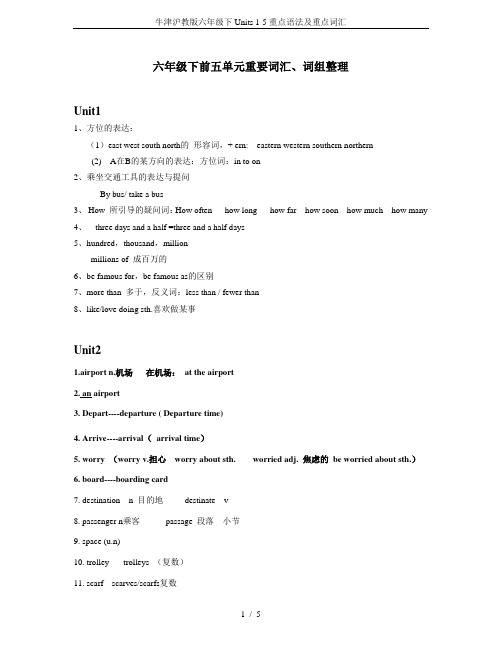
六年级下前五单元重要词汇、词组整理Unit11、方位的表达:(1)east west south north的形容词,+ ern: eastern western southern northern(2) A在B的某方向的表达:方位词:in to on2、乘坐交通工具的表达与提问By bus/ take a bus3、How 所引导的疑问词:How often how long how far how soon how much how many4、three days and a half =three and a half days5、hundred,thousand,millionmillions of 成百万的6、be famous for,be famous as的区别7、more than 多于,反义词:less than / fewer than8、like/love doing sth.喜欢做某事Unit21.airport n.机场在机场:at the airport2. an airport3. Depart----departure ( Departure time)4. Arrive----arrival(arrival time)5. worry (worry v.担心worry about sth. worried adj. 焦虑的be worried about sth.)6. board----boarding card7. destination n 目的地destinate v8. passenger n乘客passage 段落小节9. space (u.n)10. trolley-----trolleys (复数)11. scarf---scarves/scarfs复数12. enough的用法(名前形后)enough moneyquickly enough13. Have been to/in, have gone tohave been in: 表示去了某地且仍然在那里,一般与for /since 连用;have been to:表示曾经去过某地,但现在不在那个地方了,已经离开了;have gone to:表示现在已经去了某地,注意不能和for /since 连用;14. Drive sb to sp.15. Plan to do sth 计划做某事16.fly v 飞flight n 航班17.leave for some place leave some placeUnit31. something interesting. (不定代词+ 形容词)2. advice u.n. 劝告;忠告a piece of advice 一条建议a lot of / lots of advice – (否定) -- not much adviceTake ones’s advice. (接受某人的劝告)advise v. 劝告3. celebrate v. 庆祝celebration n.4. die v. 死亡dead adj. 死的dying adj. 垂死的death n. 死亡5. lose (lost, lost)•lose sth.•lose one’s way 迷路•lose a battle 打败仗•lose a match 输了比赛•lose heart 灰心•lose face 丢脸6. His job / wish / hope / hobby (爱好) / ambition (理想) is to + 动词原形.7. with --withoutwith “带着”without “不带”coffee with milk = white coffee 奶咖coffee without milk = black coffee 清咖8 .take sth. with sb. 某人携带某物live with sb. 和…住在一起9. would rather (not) + 动词原形= prefer (not) to +动词原形“宁愿(不)干某事”10. stay / keep healthy 保持健康stay “保持”(连系动词) + 形容词stay “呆; 暂住”(动词) + 副词stay (at) home / stay with sb. / stay in London happily11. an activity / activities n. 活动an indoor / outdoor activity 室内(外)活动indoor / outdoor activities 室内(外)活动12. really adv. 真正地real adj. 真正的13. enjoy doing sth. = like doing / to do sth.; love doing / to do sth.enjoy oneself = have a good time14. fun u.n. 有意思的事情funny adj15. go + v.ing “去干某事”e.g. go running / swimming / playing;16. forget (forgot, forgotten) v. 忘记forgetful adj. 健忘的forgettable adj. 容易被忘记的unforgettable adj. 难以忘怀的•forget sth. 忘记某物•forget to do sth. 忘记要干某事(结果:这件事没有做)•forget doing sth. 忘记了曾经做过的某事(结果:这件事做过了)•17. do a puzzle / do puzzles 玩拼图游戏;玩智力游戏puzzle v. 使困惑;使为难puzzled adj. 感到困惑的puzzling adj. 令人困惑的18. activity n. 行为; 活动(activities)act v. 行为;表演active adj. 活跃的inactive adj. 不活跃的(an) actor / actress (~es) n. 男演员/女演员20. health problemhealth n. 健康adj健康的(un)healthy – (un)healthier, (un)healthiest health club 健身房be in good health = healthy 身体健康be in poor health = unhealthy 身体不健康21. solve / work out a problem 解决问题22. practise (doing) sth. 练习(干)某事practice n. 练习Unit4•indoor adj. 室内的≠outdoor 室外的•really adv. 真正地real adj. 真的•forget v. (forgot-forgotten) 忘记•stay healthy=keep healthy 保持健康,系动词后跟形容词•enjoy doing sth= like doing sth 喜欢做某事enjoy oneself= have a good time 玩得开心•in the playground= on the playground 在操场上•play football 球类运动前不加the;play the piano 乐器前要加the•health n. 身体状况;健康healthy adj. 健康的unhealthy adj. 不健康的•headache 头痛stomach ache 胃痛cold 感冒fever 发烧sore throat 喉咙痛;是可数名词,前面要加a; toothache 牙疼不可数,不能加a•practise v. 练习practice n. 练习practise doing sth 练习做某事•help sb (to) do sth 帮助某人做某事, 有时可改为help sb with sth•How often 提问频率,多久一次;How many times 提问次数,几次twice a week 两星期一次(频率)twice 两次(次数)注意区别•exercise 做动词表示“锻炼(身体)”,exercise 做不可数名词表示“锻炼”exercise 做可数名词,解释为“体操”或“练习” take/do morning exercises14. should do sth 应该做某事should not do sth 不应该做某事15. would rather do sth 宁愿做某事Unit51.in the future在未来in the past在过去2.in front of在……前面(外部) in the front of在……的前面(内部)3.take a photograph照相4.wait for等待5.look for寻找look after照顾6.come out出来7.on the back在背面8.first,next,then,finally首先,接着,然后,最后9.good—looking好看的ugly难看的handsome英俊的10.put out fire灭火11.listen to music听音乐12.a report on my future关于我的未来的报道13.have to do sth.不得不做什么事14.how to make sick people better如何使病人康复15.fly a spacecraft开宇宙飞船16.come back回来17.possible可能的impossible不可能的possibility n.可能性18.weigh v. 称出重量weight n.重量19.a baker一个面包师bakery n.面包房bake v. 烤20.in 15 years’ time=in 15 years在15年后21.What will I be like.?=How will I be?我将长得怎样?I will be…and...我将会又……又……22.be good at doing/n.擅长于=do well in反义be poor atbe good for。
沪教版六年级英语下册Unit1~4复习资料
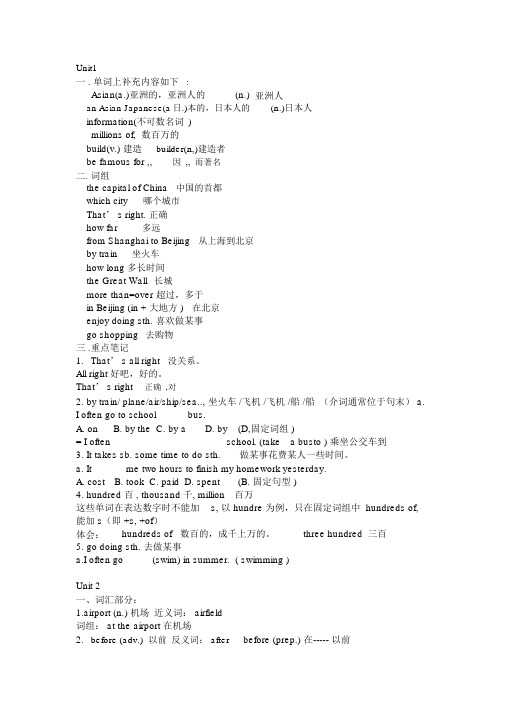
Unit1一 . 单词上补充内容如下:Asian(a.)亚洲的,亚洲人的(n.) an Asian Japanese(a日.)本的,日本人的亚洲人(n.)日本人information(不可数名词millions of, 数百万的)build(v.) 建造builder(n,)建造者be famous for ,,因,,而著名二. 词组the capital of China中国的首都which city哪个城市That’ s right. 正确how far多远from Shanghai to Beijing从上海到北京by train坐火车how long 多长时间the Great Wall长城more than=over 超过,多于in Beijing (in + 大地方 )在北京enjoy doing sth. 喜欢做某事go shopping去购物三 .重点笔记1. That’ s all right没关系。
All right 好吧,好的。
That’ s right正确,对2.by train/ plane/air/ship/sea.., 坐火车 /飞机 /飞机 /船 /船(介词通常位于句末) a.I often go to school _____ bus.A. onB. by theC. by aD. by(D,固定词组 )= I often _____ _____ _____ _____school. (take a busto ) 乘坐公交车到3. It takes sb. some time to do sth.做某事花费某人一些时间。
a. It ______me two hours to finish my homework yesterday.A. costB. tookC. paidD. spent(B. 固定句型 )4. hundred 百 , thousand 千, million百万这些单词在表达数字时不能加s, 以 hundre 为例,只在固定词组中 hundreds of,能加 s(即 +s, +of)体会:hundreds of 数百的,成千上万的。
牛津沪教版英语六年级下基础知识复习
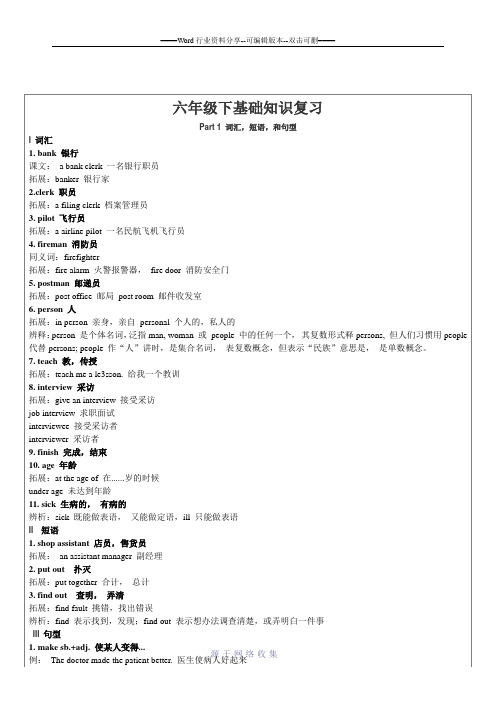
5. postman邮递员
拓展:post office邮局post room邮件收发室
6. person人
拓展:in person亲身,亲自personal个人的,私人的
辨释:person是个体名词,泛指man, woman或people中的任何一个,其复数形式释persons,但人们习惯用people代替persons; people作“人”讲时,是集合名词,表复数概念,但表示“民族”意思是,是单数概念。
2.Mary is absent from the class today,because she is ill.玛丽今天没有来上课,因为她生病了。
B.because不能和so同时出现在一个句子中。例如:
(错)Because it is raining outside,so we can't go shopping today.
A.What would you like to be?你想成为什么?
这是由what引导的特殊疑问句用来询问某人希望自己将来从事什么职业,例如:
1.--What would you like to be?你想成为什么?
--I'd like to be a doctor.我想当一名医生。
2.--What would your sister like to be?你姐姐想成为什么?
1.I’d hate you to thinkIwas criticizing you.我可不愿让你觉得我是在批评你。
2.I'd be only too glad to help.我非常愿意帮忙。
B.缩略式常写为“’d”,I’d=Iwould我想……否定式为would not,其缩略式为“wouldn’t”,例如:
完整沪教版英语六年级下册词汇.docx
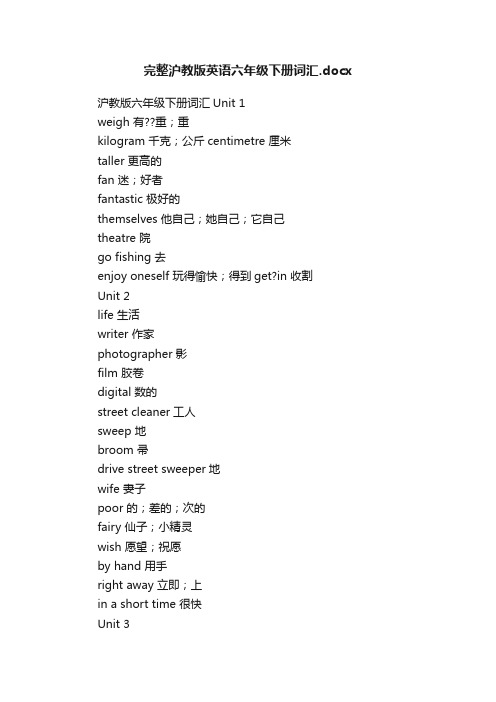
完整沪教版英语六年级下册词汇.docx沪教版六年级下册词汇Unit 1weigh 有??重;重kilogram 千克;公斤centimetre 厘米taller 更高的fan 迷;好者fantastic 极好的themselves 他自己;她自己;它自己theatre 院go fishing 去enjoy oneself 玩得愉快;得到get?in 收割Unit 2life 生活writer 作家photographer 影film 胶卷digital 数的street cleaner工人sweep 地broom 帚drive street sweeper地wife 妻子poor 的;差的;次的fairy 仙子;小精灵wish 愿望;祝愿by hand 用手right away 立即;上in a short time 很快Unit 3carry 背;提;拿online 在地;在的head teacher校PS 附言(用于信末)mountain 山;山脉even 甚至space太空dinosaur 恐a piece of 一;一片have a picnic 去野餐better and better越来越好Unit 4oil 油oil painting 油画powerful 强有力的;力量大的ink 墨水;墨汁Chinese ink painting 中国水墨画brush 画笔;刷子;刷paints 绘画颜料artist 艺术家;画家unhappy 不高兴的carefully 仔细地on the left 在左边on the right 在右边all the time 一直;始终Unit 5craft 手艺;工艺crown 王冠;皇冠scissors剪刀tape胶带glue 胶水saw 锯craftsman工匠;手艺人(复数craftsmen)tool 工具easily 容易地himself 他自己still 仍然model house房子模型a long time ago 很久以前at work 忙着(做事情)say to oneself 自言自语Unit 6long race 长跑short race 短跑win 获胜;赢long jump 跳远high jump 调高swimsuit (尤指女式的)游泳衣swimming cap 游泳帽swimming pool 游泳池warm-up 准备活动;热身练习fit 健壮的swimming goggles 游泳镜Unit 7bell 铃铛neck 脖子ago 以前gatekeeperpraise;称praise?for?因??而表??Unit 8signmiddle 中;中部;中心special特的path 小路;小径may 可能;可以lost 迷路的;迷失的worry 担心follow 跟随;跟着in the middle 在中look out 小心;当心no smoking 禁止吸烟no swimming 禁止游泳get lost 迷路some time 一段on the way 在路上vase 花瓶pen holder 笔筒envelope 信封plastic 塑料制的;塑料的rubbish bin 垃圾桶truck 卡piece 碎片;碎cloth 布;布料throw away 扔掉Unit 10fairy tale 童(故事)adult 成年人well-known 所周知的;著名的stronger 更大的than 比scarf 巾(复数 scarves或scarfs)blow off 吹掉take off 脱掉Unit 9Unit 11reuse 重新利用Western 西方的can 金属罐turkey 火rubber 橡皮bright 明亮的;的laugh at 嘲笑jack-o’-lantern 南瓜灯Unit 12pea豌豆pod 豆荚forever 永远bigger 更大的excited 兴奋的bullet 子弹lazy 懒惰的roof 屋顶yard 院子hit 碰撞;撞击see the world 见世面one by one 一个接一个地look out of 往外看。
沪教牛津版六年级(预初)下册英语知识点归纳
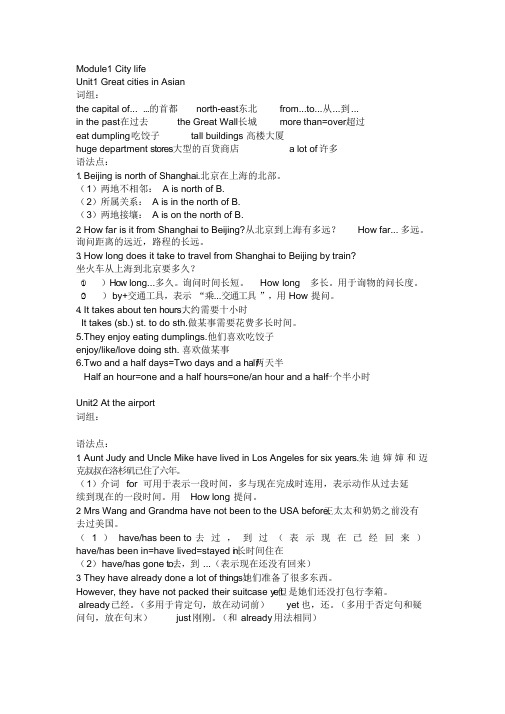
Module1 City lifeUnit1 Great cities in Asian词组:the capital of... ...的首都north-east东北from...to...从...到...in the past在过去the Great Wall长城more than=over超过eat dumpling 吃饺子tall buildings 高楼大厦huge department stores大型的百货商店 a lot of 许多语法点:1.Beijing is north of Shanghai.北京在上海的北部。
(1)两地不相邻: A is north of B.(2)所属关系:A is in the north of B.(3)两地接壤:A is on the north of B.2.How far is it from Shanghai to Beijing?从北京到上海有多远?How far... 多远。
询问距离的远近,路程的长远。
3.How long does it take to travel from Shanghai to Beijing by train?坐火车从上海到北京要多久?(1))How long...多久。
询问时间长短。
How long 多长。
用于询物的问长度。
(2))by+交通工具,表示“乘...交通工具”,用How 提问。
4.It takes about ten hours大.约需要十小时It takes (sb.) st. to do sth.做某事需要花费多长时间。
5.They enjoy eating dumplings.他们喜欢吃饺子enjoy/like/love doing sth. 喜欢做某事6.Two and a half days=Two days and a hal两f 天半Half an hour=one and a half hours=one/an hour and a ha一l f 个半小时Unit2 At the airport词组:语法点:1.Aunt Judy and Uncle Mike have lived in Los Angeles for six years.朱迪婶婶和迈克叔叔在洛杉矶已住了六年。
沪教版六年级下册英语Unit1 You and me知识点习题
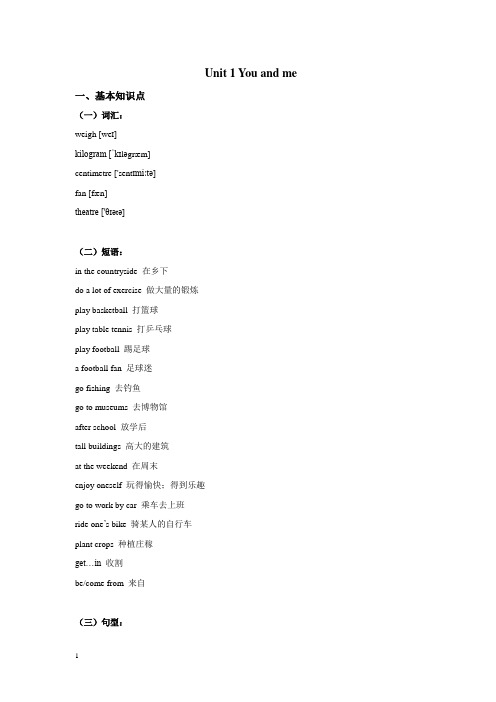
Unit 1 You and me 一、基本知识点(一)词汇:weigh [weɪ]kilogram [ˈkɪləgræm]centimetre ['sentɪmiːtə]fan [fæn]theatre ['θɪətə](二)短语:in the countryside 在乡下do a lot of exercise 做大量的锻炼play basketball 打篮球play table tennis 打乒乓球play football 踢足球a football fan 足球迷go fishing 去钓鱼go to museums 去博物馆after school 放学后tall buildings 高大的建筑at the weekend 在周末enjoy oneself 玩得愉快;得到乐趣go to work by car 乘车去上班ride one’s bike 骑某人的自行车plant crops 种植庄稼get…in 收割be/come from 来自(三)句型:1. How much do you weigh?你有多重?2. I weigh 40 kilograms.我重40公斤。
3. How tall are you?你有多高?4. I’m 152 centimetres tall.我身高152厘米。
5. What do you usually do after school?放学后你通常做什么?6. I usually play football after school.我通常放学后踢足球。
7. There are a lot of tall buildings in the city.这个城市有许多高楼。
(四)重难点、易错点:1. 询问体重和身高以及回答方式。
询问体重:____________________________________________回答方式:____________________________________________询问身高:____________________________________________回答方式:____________________________________________2. 比较级的基本变化(tall)3. 频率副词____________________________________________4. 复习现在进行时(is visiting)5. there be 句型6. 写作:学会如何描述自己居住的城市或乡村(建筑、交通方式、人类活动等)I live in the _________________________________________There are/aren't _________________________________________People here like to ____________________________________________二、典型例题1. Listen! The students ________ English.A. readingB. readC. are reading【解析】答案:C 根据Listen为现在进行时标志词,所以应该用be+doing.可知答案为C。
沪教版六下英语单元知识汇总
沪教版六下英语单元知识汇总摘要:一、单元知识点概述1.单词和短语2.句型和语法3.文化背景知识二、具体知识点解析1.单词和短语1.1 的新单词和短语1.2 复习已学过的单词和短语2.句型和语法2.1 重点句型2.2 语法点解析3.文化背景知识3.1 相关习俗和传统3.2 相关国家和地区简介正文:沪教版六下英语单元知识汇总一、单元知识点概述沪教版六下英语单元知识汇总主要分为单词和短语、句型和语法、文化背景知识三个部分。
以下将分别对这些部分进行详细解析,以帮助学生更好地掌握本册教材的内容。
1.单词和短语在本册教材中,我们学习了许多新单词和短语。
这些新单词和短语涵盖了各种场景和主题,如地点、运动、兴趣爱好等。
通过学习这些单词和短语,学生们可以丰富自己的词汇量,并在实际生活中运用到这些知识。
此外,本单元还复习了一些已学过的单词和短语。
这对于巩固学生的词汇基础具有重要意义,也为他们在后续的学习中运用这些词汇提供了便利。
2.句型和语法在本单元中,我们重点学习了若干句型和语法点。
这些句型和语法知识是英语学习的基础,对于提高学生的口语和书面表达能力具有重要意义。
3.文化背景知识沪教版六下英语教材在传授语言知识的同时,也注重培养学生的跨文化交际能力。
在本单元中,我们介绍了与课文内容相关的习俗和传统,以及一些国家和地区的简介。
通过这些知识,学生可以更好地了解英语国家的文化,为日后与外国朋友交流打下基础。
二、具体知识点解析1.单词和短语在本单元中,我们学习了许多新单词和短语。
例如:- 新单词:kilogram(千克)、centimetre(厘米)、fan(足球、电影等迷)、theatre(剧院)、life(生活)、writer(作家)等。
- 短语:do a lot of exercise(做大量的运动)、play basketball(打篮球)、after school(放学后)、play football(踢足球)、a football fan(足球迷)、go fishing(去钓鱼)、go to museums(去博物馆)等。
沪教版六下英语单元知识汇总
沪教版六下英语单元知识汇总沪教版六年级下册英语共包含了十个单元,每个单元都涵盖了丰富多彩的知识内容。
以下是对每个单元的知识内容的简要概括:第一单元是关于“Do you have any hobbies?”,主要介绍了问及他人爱好的方式,以及介绍自己的爱好。
第二单元是关于“Where is the post office?”,主要涉及到问路和指路的相关用语和句型。
第三单元是关于“Would you like to visit the Science Museum?”,主要介绍了邀请他人参加活动的方式和礼貌用语。
第四单元是关于“Can you play the guitar?”,主要介绍了询问他人能力和回答的相关句型。
第五单元是关于“My school day”,主要介绍了描述日常活动和时间安排的相关词汇和句型。
第六单元是关于“What’s the matter with you?”,主要涉及到询问他人健康状况和表达自己的不适。
第七单元是关于“Where did you go on vacation?”,主要介绍了谈论假期活动和经历的相关词汇和句型。
第八单元是关于“Have you ever been to a zoo?”,主要涉及到谈论过去的经历和经历过的事情。
第九单元是关于“What will you do if it rains?”,主要介绍了表达假设和条件的相关句型。
第十单元是关于“Let’s celebrate!”,主要涉及到邀请他人参加活动和表达祝贺的相关用语和句型。
每个单元都包含了词汇、语法、对话和阅读等方面的内容,通过这些内容的学习,学生可以全面提高他们的英语能力。
希望这个简要概括能够帮助你对这些单元的知识内容有一个整体的了解。
沪教版六年级英语复习资料(已标注重点)
沪教版六年级英语复习资料(已标注重点)
为了帮助六年级的学生复英语,我准备了以下复资料。
这些资料基于沪教版课本,并已标注重点内容。
希望这份资料能帮助学生们更好地复和准备英语考试。
Unit 1: My School Life
- 重点:常用动词的过去式,表示喜好和不喜欢的表达
Unit 2: Holidays
- 重点:问路和指路的表达,描述旅行活动
Unit 3: My Hobbies
- 重点:运动和爱好的表达,频度副词的使用
Unit 4: My City
- 重点:城市地标和景点的描述,询问和提供信息的能力
Unit 5: Healthy Habits
- 重点:身体部位和健康惯的描述,建议和禁止的表达
Unit 6: At the Zoo
- 重点:描述动物的外貌和行为,询问和提供信息的能力
Unit 7: Food and Drinks
- 重点:食物和饮料的名称,句式“What do you want?”的用法
Unit 8: My Family
- 重点:家庭成员和关系的描述,家庭活动的表达
Unit 9: My Daily Routine
- 重点:日常活动的表达,日常时间的描述
Unit 10: Jobs
- 重点:职业名称和工作内容的描述,询问和回答关于职业的问题
以上是本复资料的主要内容。
希望学生们能通过复这些重点内容来巩固英语知识,取得优异的成绩。
祝大家研究愉快!
(注意:本文档内容仅供复习参考,具体考试内容以教材为准。
)。
(完整word版)沪教版英语六年级下册词汇
(完整word版)沪教版英语六年级下册词汇沪教版六年级下册词汇Unit 1weigh 有……重;重kilogram千克;公斤centimetre 厘米taller更高的fan 迷;爱好者fantastic 极好的themselves 他们自己;她们自己;它们自己theatre 剧院go fishing 去钓鱼enjoy oneself 玩得愉快;得到get…in 收割Unit 2life生活writer 作家photographer 摄影师film 胶卷digital数码的street cleaner 环卫工人sweep 扫地broom扫帚drive 驾驶street sweeper 扫地车wife 妻子poor 贫穷的;差的;次的fairy 仙子;小精灵wish 愿望;祝愿by hand 用手right away 立即;马上in a short time 很快Unit 3carry 背;提;拿online 在线地;在线的head teacher 校长PS 附言(用于信末)mountain山;山脉even 甚至space 太空dinosaur 恐龙a piece of 一张;一片have a picnic 去野餐better and better 越来越好Unit 4oil 油oil painting 油画powerful 强有力的;力量大的ink墨水;墨汁Chinese ink painting 中国水墨画brush 画笔;刷子;刷paints 绘画颜料artist 艺术家;画家unhappy 不高兴的carefully仔细地on the left 在左边on the right 在右边all the time 一直;始终Unit 5craft 手艺;工艺crown 王冠;皇冠scissors 剪刀tape胶带glue 胶水saw 锯craftsman工匠;手艺人(复数craftsmen)tool 工具easily 容易地himself 他自己still 仍然model house 房子模型a long time ago 很久以前at work 忙着(做事情)say to oneself 自言自语Unit 6long race 长跑short race 短跑win 获胜;赢long jump 跳远high jump 调高swimsuit (尤指女式的)游泳衣swimming cap游泳帽swimming pool 游泳池warm-up准备活动;热身练习fit 健壮的swimming goggles游泳镜Unit 7bell 铃铛neck 脖子ago 以前gatekeeper门卫praise赞扬;称赞praise…for…因……而表扬……Unit 8sign 标识middle 中间;中部;中心special特别的path小路;小径may 可能;可以lost 迷路的;迷失的worry 担心follow 跟随;跟着in the middle在中间look out 小心;当心no smoking 禁止吸烟no swimming 禁止游泳get lost 迷路some time 一段时间on the way 在路上Unit 9reuse 重新利用can 金属罐rubber 橡皮vase 花瓶pen holder 笔筒envelope 信封plastic 塑料制的;塑料的rubbish bin 垃圾桶truck卡车piece 碎片;碎块cloth 布;布料throw away 扔掉Unit 10fairy tale 童话(故事)adult 成年人well-known 总所周知的;著名的stronger 更强大的than 比scarf 围巾(复数scarves或scarfs)blow off 吹掉take off 脱掉Unit 11Western 西方的turkey火鸡bright 明亮的;鲜艳的laugh at 嘲笑jack-o’-lantern 南瓜灯Unit 12pea豌豆pod豆荚forever 永远bigger 更大的excited兴奋的bullet 子弹lazy 懒惰的roof 屋顶yard院子hit 碰撞;撞击see the world 见世面one by one 一个接一个地look out of 往外看。
- 1、下载文档前请自行甄别文档内容的完整性,平台不提供额外的编辑、内容补充、找答案等附加服务。
- 2、"仅部分预览"的文档,不可在线预览部分如存在完整性等问题,可反馈申请退款(可完整预览的文档不适用该条件!)。
- 3、如文档侵犯您的权益,请联系客服反馈,我们会尽快为您处理(人工客服工作时间:9:00-18:30)。
Unit1一. 单词上补充内容如下:Asian(a.)亚洲的,亚洲人的(n.) 亚洲人an Asian Japanese(a.)日本的,日本人的(n.)日本人information(不可数名词)millions of, 数百万的build(v.)建造builder(n,)建造者be famous for ……因……而著名二. 词组the capital of China 中国的首都which city 哪个城市That’s right. 正确how far 多远from Shanghai to Beijing 从上海到北京by train 坐火车how long 多长时间the Great Wall 长城more than=over 超过,多于in Beijing (in +大地方) 在北京enjoy doing sth. 喜欢做某事go shopping 去购物三.重点笔记1.That’s all right 没关系。
All right好吧,好的。
That’s right 正确,对2. by train/ plane/air/ship/sea..…坐火车/飞机/飞机/船/船(介词通常位于句末)a. I often go to school _____ bus.A. onB. by theC. by aD. by (D,固定词组)= I often _____ _____ _____ _____school. (take a bus to ) 乘坐公交车到3. It takes sb. some time to do sth. 做某事花费某人一些时间。
a. It ______me two hours to finish my homework yesterday.A. costB. tookC. paidD. spent (B. 固定句型)4. hundred 百, thousand 千, million百万这些单词在表达数字时不能加s, 以hundre为例,只在固定词组中hundreds of…能加s(即+s, +of)体会:hundreds of 数百的,成千上万的。
three hundred 三百5. go doing sth. 去做某事a.I often go _____(swim) in summer. ( swimming )Unit 2一、词汇部分:1.airport (n.) 机场近义词:airfield词组:at the airport 在机场2.before (adv.) 以前反义词:after before (prep.) 在-----以前反义词:after 在---以后3.several (a.)几个=a few (后面常跟名词复数)4. however (adv.) 然而(常常放句首,也可以放句中,但有逗号与句子分开)注意:同义词:but (只能用在句中)5. flight (n.) 航班动词:fly6. departure (n.) 离开;出发departure time 起飞时间arrival time 到达时间动词:depart7. have to /has to 不得不(后面跟动词原形)同义词:must注意:have to/has to 的一般疑问句要用助动词来帮助提问,否定句也是如此。
8.worry (v.) (n.) 担心;担忧worry about sb/sth. 为----担忧=be worried about sb./sth.9.note (n.) 注释;提醒notebook 笔记本10. bring (v.) 带来反义词:take 带走carry 随身带get 去取二.课文部分:1.Mrs,Wang and Grandma are going to Los Angeles, the USA.are going 表示“将要去”,在英语中,come, go ,leave, visit 这四个词的进行时态,可以表示“将要来/去/离开/拜访”。
3.They plan to stay there for two year.4.plan to do sth. 计划做某事= be going to do sth.= be about to do sth.3.Mrs. Wang and Grandma have not been to the USA before.have/has been to 曾经去过某地(人已回来)have/has gone to 去了某地(人未回来)have/has been in 呆在某地5.Grandma has bought Aunt Judy plenty of T-shirts.buy sb. Sth. =buy sth for sb. 为某人买某物6.However, they haven’t packed their suitcase yet.pack (v.) 装箱;打包(n.)包,裹7.Have you got enough space in your suitcase?1)space (n.) 空间=room 不可数名词space(n.)太空spaceship 宇宙飞船2)enough (adj.) 足够的修饰名词时放在名词前面,修饰形容词或副词时放在他们后面。
7.Let me drive you to the airport.drive sb to sp. 开车送某人去某地7.All passengers must arrive at the airport two hours before the departure time. arrive at 到达(小地方) arrive in 到达(大地方)= reach =get to注意:如果是的“到家/到这儿/到那儿”,只能用“arrive/ home/here/there=get home/here/there”,不能加介词。
9.What time does your plane leave for Los Angeles tomorrow?1.) what time 是对具体的时刻提问,而when 是对何时提问2.) leave for 离开去某地京。
10.already,yet .just 用于现在完成时态中。
already ,just 用于肯定句,表示“已经”、“刚刚”yet 用于疑问句和否定句中,表示“还”、“仍然“Unit 3一、词汇部分1.race (n.)比赛通常指速度竞赛,如赛跑、赛车game ( n.) 游戏;比赛通常指竞争性的体育运动,如大型的国内外体育比赛e.2.celebrate (v.)庆祝celebration (n.) 庆祝3.(be)born (v.) 出生注意:born 往往与be动词的过去式连用(was born/were born),它的原形是:bear4.ago (adv.) 以前常用于过去时态中before 在-----之前常用于完成时态中注意:later (adv.) 以后;后来通常也用于过去时态中,表示在具体某个时间之后。
5.country (n.) 国家;乡村6.advice (n.) 忠告;劝告;建议advice(v.)忠告;劝告,建议注意:advice是一个不可数名词,一条建议可以说“a piece of advice”许多建议可以说“ a lot of/much advice”词组:take one’s advice 接受某人的建议give one’s advice 给某人建议7.die (v.) (died ,died)死death (n.) 死亡dead (a.) 死的8.lose (v.) (lost, lost) 输掉;迷失(路);失去9.battle (n.) 战役(常指大的战役)fight (n.) 战斗;打架(常指大的战役中的小战斗)10.danger (n.) 危险dangerous (a.) 危险的be in danger 处于危险中11.remember (v.) 记住反义词:forgetremember to do sth 记得要做某事(还未做)remember doing sth 记得曾经做过某事(已做过)forget to do sth 忘记去做某事(还未做)forget doing sth 忘记曾经做过某事(其实已做过)12.send (v.) (sent,sent) 送;派;寄二、课文部分:1.I would like to know something about the Quyuan.1)know about 了解;知道e注意:know 认识。
2)would like to do sth 想要做某事=want to do sth.注意:would like 可以缩写为‘d likeWould you like to/some-----?表示建议句型,回答可用:Yes,please./No,thanks.2.He loved his country very much.love/like -----very much 非常喜欢=be interested in sth3.the king died and the new king didn’t listen to him.listen to sb./sth 听某人/某事4.It was the fifth day of the fifth lunar month农历的表达法:the first day of the first lunar month 农历正月初一the fifteenth day of the first lunar month农历正月十五the fifteenth day of the eighth lunar month农历八月十五5.I like sweet rice with beans./without beans.with 有,带有反义词:without 没有6.I don’t like salty ones with meat.在英语中,常用代词one代替上文提到过的人或物,ones是one的复数形式。
7.I would rather have s piece of bread.would rather 宁可;宁愿(后面跟动词原形)可以缩写为‘d rather 相当于prefer to do sth.,否定形式为would rather not do sth.8.Qu yuan was very sad.sad(a.) 悲伤的;伤心地sadly(adv.)9.His job was to give advice to the king.10.这是一个常见的句型:sb’s job is to do sth. 在语法上称为动词不定式做表语。
